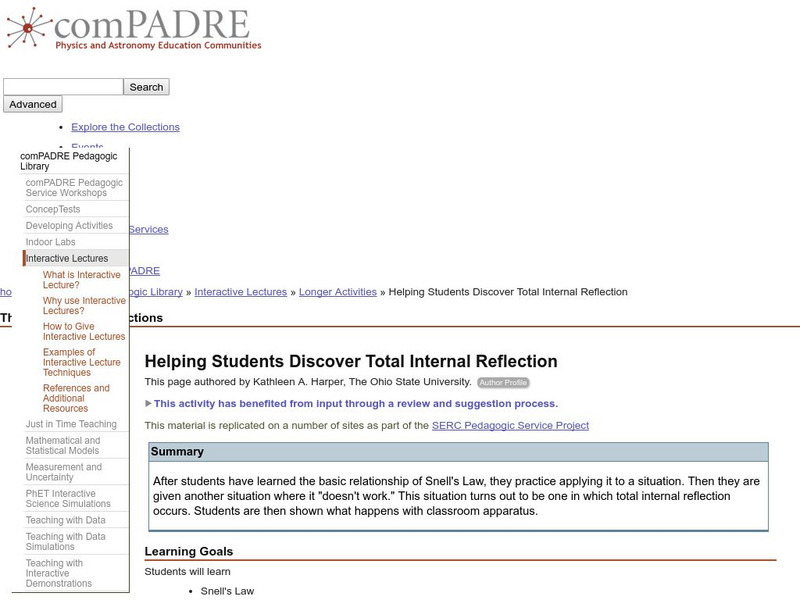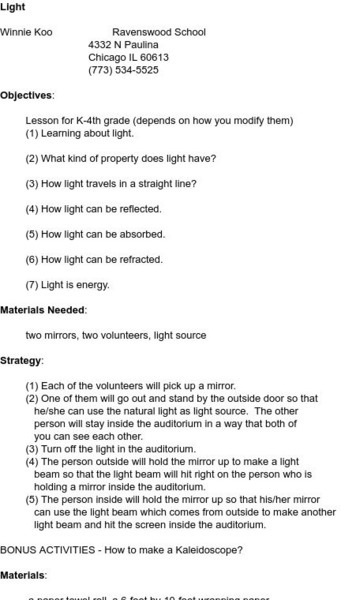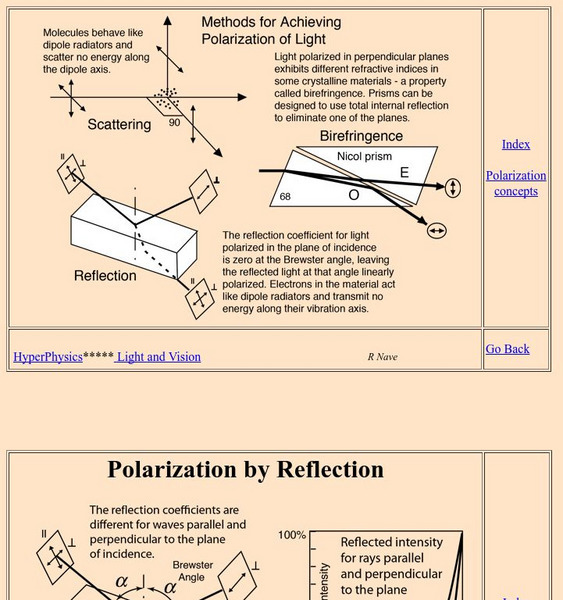Science Education Resource Center at Carleton College
Serc: Helping Students Discover Total Internal Reflection
After students have learned the basic relationship of Snell's Law, they practice applying it to a situation. Then they are given another situation where it doesn't work, which turns out to be one in which total internal reflection occurs.
Physics Classroom
The Physics Classroom: Reflection/ray Model of Light: Anatomy of a Curved Mirror
A physics tutorial focused on the behavior of light as it relates to concave mirrors.
Physics Classroom
The Physics Classroom: Refraction and the Ray Model of Light: Rainbow Formation
Understand the physics behind Roy G. Biv, and how rainbows are formed by drawing upon our understanding of refraction, internal reflection, and dispersion.
CK-12 Foundation
Ck 12: Plix: Law of Reflection: Angle of Incidence
[Free Registration/Login Required] In the scenario shown here, the laser cannot shine through the black barrier but can hit all three targets by reflecting off of the floor. Use the red dot to change the angle of the laser generator and...
Physics Classroom
The Physics Classroom: Reflection and Mirrors: Name That Image Interactive
Students participate in this skill-building activity where they explore how the location of an object in front of a curved mirror affects the characteristics of the projected image.
Georgia Department of Education
Ga Virtual Learning: Geometric Optics
This interactive unit will help students to understand the basics of geometric optics. Learn what happens when light strikes the boundary between two media as well as the difference between a real and virtual image? Also explore the law...
PBS
Pbs Learning Media: Laser Waterfall
In this video from the Encyclopedia of Physics Demonstrations, students will observe how a laser beam is trapped in a water jet because the light reflects against the surface of the water. [1:03]
ClassFlow
Class Flow: Introduction Lesson on Light
[Free Registration/Login Required] This flipchart is an introduction lesson on light. It explains absorption, transmission, and reflection. It contains real pictures that allow students to see how matter in an object determines how much...
Science and Mathematics Initiative for Learning Enhancement (SMILE)
Smile: Light (K 4)
This site provides two activities that young scholars can do in class. One uses mirrors to reflect light beams whole another is making a kaleidescope.
ClassFlow
Class Flow: Introduction to Light
[Free Registration/Login Required] This flipchart introduces fifth graders to the science of light. Principles such as transparent, translucent, opaque, reflection, and refraction are covered. Concave and convex mirrors and lenses are...
My Science Site
My Science Site: The Light for Sight [Pdf]
This resource offers a hands-on activity for science teachers to teach about the eye and it's ability to see images. Also discusses refraction and reflection. This resource is in PDF form; requires Adobe Reader.
Ducksters
Ducksters: Physics for Kids: Behavior of Light as a Wave
Kids learn about the behavior of light as a wave in the science of physics including reflection, refraction, and diffraction.
NumberNut
Number Nut: Light and Colors
Discover the relationship between light and colors in this brief lesson. Links to related color identification activities, Color Memory Challenge and Identifying Colors Quiz. Immediate feedback given to responses that includes...
Physics Classroom
The Physics Classroom: Reflection and the Ray Model of Light: Ray Diagrams
This illustrated physics tutorial serves as a step-by-step guide to drawing ray diagrams. It includes an opportunity for students to practice and check their answers.
Physics Classroom
The Physics Classroom: Reflection and Ray Model of Light: Why an Image Is Formed
This illustrated physics tutorial uses animations to attempt to explain to students why images appear.
Physics Classroom
The Physics Classroom: Reflection and Ray Model of Light: Image Characteristics
Through illustrated examples and interactive practice problems, students learn about real and virtual images.
Utah Education Network
Uen: Enlightening Explorations
This lesson engages students in making observations about different features of light. Students will circulate in different light stations, reflect on what they have observed, and then write about what they learned.
Georgia State University
Georgia State University: Hyper Physics: Methods of Polarization
At this college physics department site, the polarization of light is explained and illustrated as well as the primary methods of polarization (scattering, reflection, and refraction).
Georgia State University
Georgia State University: Hyper Physics: Crossed Polarizers
At this univeristy physics department site, the polarization of light is explained and illustrated. Methods for analyzing light to determine the degree of polarization are stated and explained with equations.
Utah Education Network
Uen: Enlightening Explorations, Part Ii
This lesson engages students in learning about light. Studets will describe how light is produced, reflected, refracted, and separated.
Utah Education Network
Uen: I'm So Bright! I Wear My Shades Indoors!
This lesson engages students in learning about light through multiple sources. Students will learn how light is produced, reflected, refracted, and separated. Students will communicate their findings through an independent project that...
TeachEngineering
Teach Engineering: Security System Design
Middle schoolers apply everything they have learned about light properties and laser technologies to designing, constructing and presenting laser-based security systems that protect the school's mummified troll. In the associated...
TeachEngineering
Teach Engineering: Beating the Motion Sensor
Lighting is responsible for nearly one-third of the electricity use in buildings. One of the best ways to conserve energy is to make sure the lights are turned off when no one is in a room. This process can be automated using motion...
Discovery Education
Discovery Education: 3 M Young Scientist Lab: Gelatin Optic Fibers
Strips of gelatin dessert and a laser pointer demonstrate total internal reflection.
Other popular searches
- Light Reflection
- Light Reflection Refraction
- Light Reflection Mirrors
- Light Reflection by Mirror
- Science Light Reflection
- Light Angle of Reflection
- Light Reflection and Color
- Light Reflection and Mirrors
- Light Reflection Projects
- Light and Reflection
- Light Reflection Internet
- Reflection of Light Waves

















